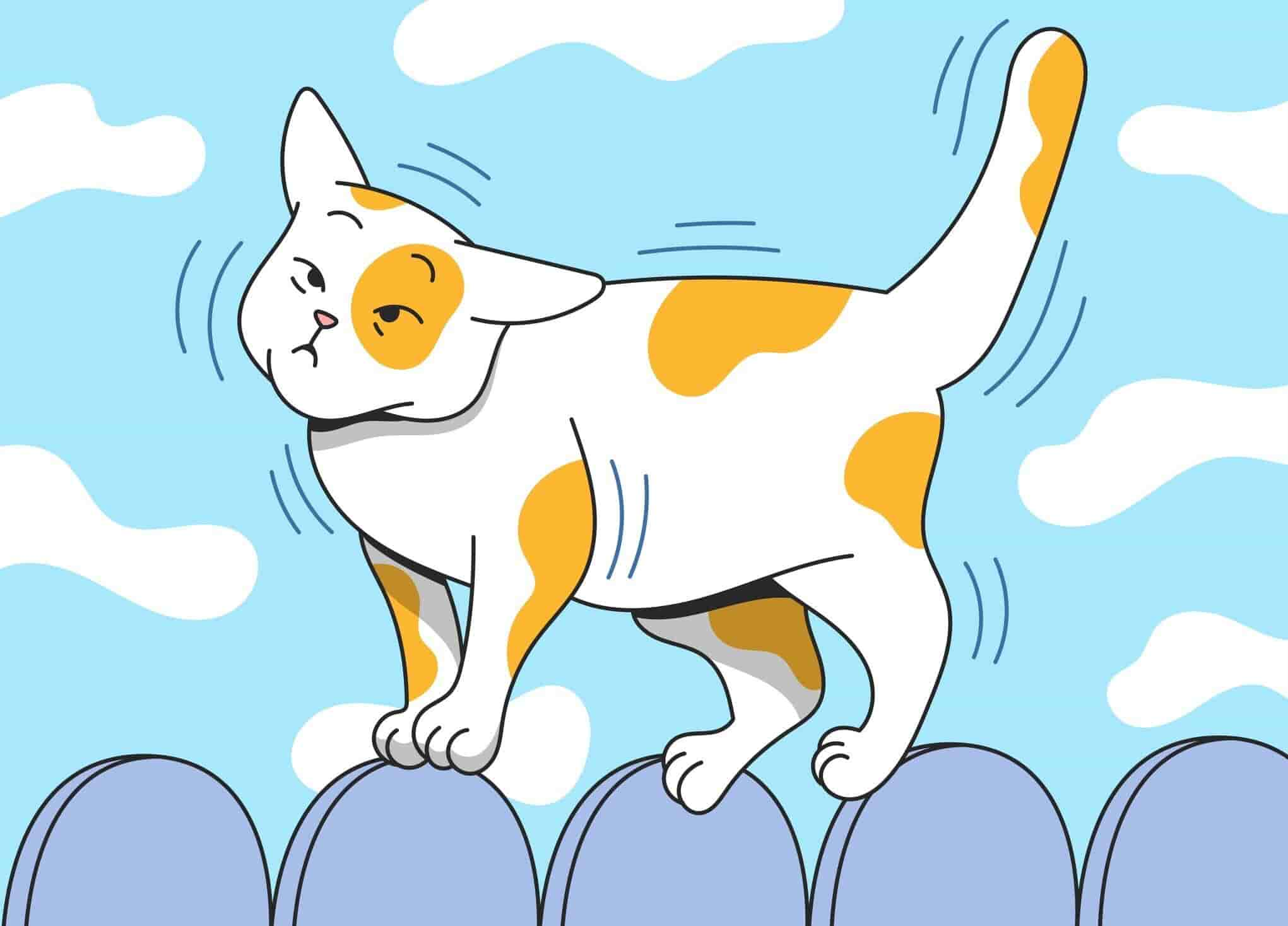Witnessing cat tremors may ring alarm bells for us, cat parents. However, it helps to be aware of the causes of tremors in cats to help us keep calm and determine what to do when our cat exhibits such symptoms.
Tremors in cats are actually common, the causes of which range from benign to serious. It can be defined as involuntary, rhythmic, and periodic movements in the muscle that results in shaking in one or more areas of the body, where the muscle alternates between contracting and relaxing.
Tremors are observed when cats are awake and don't happen when they are sleeping. If, however, the shaking continues when your cat is sleeping, then it’s not considered a tremor.
When a cat is affected by tremors, involuntary movement may be observed in any part of their body. It can be localized in only one part of the body, or it may be generalized/ affect the whole body. Usually, localized tremors are observed in a cat’s head or rear limbs.
This article was reviewed by our expert veterinarian, Chris Vanderhoof (DMV).
Stop Googling - Ask a Real Vet
Causes of Tremors in Cats
There are many possible causes of cat tremors, and the symptoms may depend on which part of the body is affected. Among these causes are:
- Congenital (at birth);
- Genetic;
- Injury or trauma;
- Idiopathic (unknown);
- Severe pain or weakness;
- Cerebellar abnormalities;
- Toxicity;
- Inflammation;
- Hypoglycemia;
- A disease in the nervous system;
- Kidney failure;
- A side effect of certain medications;
- Vestibular diseases;
- Neuromuscular diseases;
- Compressive spine lesions.
Wobbly Cat Syndrome
While cats are generally known to move gracefully, some cats are born with a rare condition that affects their balance. This condition is known as the wobbly cat syndrome, technically termed cerebellar hypoplasia in cats. Note that despite lacking in coordination, a cat that has wobbly cat syndrome can live a happy and full life just like other cats.
According to Dr. Joseph Mankin who is an associate professor of Neurology at the Texas A&M College of Veterinary Medicine & Biomedical Sciences, cerebellar hypoplasia in cats (a.k.a. wobbly cat syndrome) is when that part of the brain that is in control of coordination and balance called the cerebellum doesn’t properly develop.
As a result, the cat exhibits excessive head or leg movements. The main symptom of cerebellar hypoplasia in cats is a lack in coordination. For example, a cat’s hind legs may wobble when they stand or walk or their head may jerk when they eat or drink.
The condition doesn’t develop over time. Rather, it is inborn / observed from birth. According to Mankin, “the most common cause is an in-utero infection with the feline panleukopenia virus”.
There is no cure or treatment for cerebellar hypoplasia. However, it usually doesn’t have serious effects. Ideally, these cats are to be kept indoors and in homes that are free from hazards to avoid accidents or injuries.
Cat Trembling vs. Cat Tremor
The main difference between a cat tremor and other kinds of shaking such as cat trembling is that real tremors stop when a cat sleeps. On the other hand, other forms of shaking may continue when a cat is sleeping.
Read more: Why Do Cats Twitch In Their Sleep?
Treatment and How to Manage Cat Tremors
Treatment
Because a tremor happens due to an underlying condition, what we want is to treat the underlying condition that is causing it. To find out the cause, lab tests may be needed for your veterinarian to be able to properly diagnose and determine the corresponding treatment if necessary. However, note that some tremors do not have any available treatment.
If the tremor is due to a drug, your veterinarian may recommend an alternate drug to prevent the tremor from happening. On the other hand, if toxicity is suspected, it is important to eradicate the toxin from your cat’s environment to avoid your cat being exposed further.
For example, your cat may have accessed a chemical substance around the home, or maybe they chewed on a plant that is considered toxic for cats. If that is the case, an antidote may be given to treat your cat.
Note from Dr. Vanderhoof: In such cases, it is helpful to refer to the ASPCA Poison Control website, which has a comprehensive list of toxic plants and household products. Pet parents can also call the number to speak to a veterinary toxicologist who will provide instructions that their vet can use to treat properly.
Certain tremors that are related to the nervous system may need surgery to treat the disease. Your veterinarian may also prescribe medications to help control the excessive movements.
Management
One way to prevent the intensity of your cat’s symptoms is not to engage them in strenuous exercises. However, exercise is also beneficial to your cat so just make sure that the exercises are of low impact or are more relaxed. The prognosis mainly depends on treating the underlying disease successfully.
However, cats who have certain tremors that don’t have treatment may still live happily and without serious effects when they are given the proper care. When it comes to tremors, it is very important to be able to monitor your cat. With this, pet cameras such as the Petcube interactive pet camera would be very helpful to keep tabs on your cat and be able to know when something is amiss.
This is also very helpful during the treatment process. Apart from being an affordable HD camera, the Petcube cam also has a 24/7 online vet service to boot. With it, you get peace of mind when it comes to taking care of your pet’s health and wellness.
Nevertheless, cats may be susceptible to emergencies that involve tremors. During such situations, receiving assurance and support helps lessen our worries as pet owners. Petcube’s Pet Emergency Fund offers this and more, with a coverage of $3000 per year for upto 6 pets.
Pet Emergency Fund welcomes pets regardless of age, breed, and medical history. Medical bills are also paid right after treatment so you won’t have to worry about shouldering the high emergency care fees. Not to mention, they also have an online vet service where you can consult with certified vets anytime and anywhere. After all, having the support of a professional regarding your pet’s health can go a long way especially in such challenging times.
Good news to our beloved blog readers! We are giving away an exclusive 27% off on subscriptions if you follow this link.
Online Vet
It would really help to talk to a professional when you are having concerns about your cat’s health such as when they are having tremors. Petcube’s Online Vet is a perfect example of innovative services that make it easier for both pet owners and their pets.
With the service, you get professional help from a team of licensed veterinarians anytime and anywhere. When it comes to cat tremors, for instance, being able to consult with a vet 24/7 when they are exhibiting tremors would help ease your worries.
This extends to taking care of your cat while they’re being treated, as well as how to live with or manage your cat’s tremor if there is no treatment.
FAQ
What does a cat tremor look like?
A cat tremor can be observed while a cat is awake, and doesn’t happen when they are sleeping. It appears as uncontrollable shaking and can either be localized in just one part of the body or generalized which affects the whole body.
What does it mean when a cat has head tremors?
There are a number of possible reasons for head tremors in cats, and one among them is Cerebellar Hypoplasia. This condition causes temporary head tremors where in a cat’s head shakes uncontrollably as a result of having a damaged cerebellum. It usually happens when your cat is focusing, and often lasts for just a few seconds.
Why is my cat trembling while sleeping?
When a cat trembles while sleeping, there are several possible reasons. One among these reasons is because they may be dreaming during REM sleep. If so, this behavior is normal.
Another possible reason is because of allergies where the twitching may be due to ear mites, skin conditions, fleas, or matted fur. Some causes of trembling may just be normal, while some may be serious.
If you are worried about your cat trembling while sleeping, call a veterinarian immediately.

Was this article helpful?
Help us make our articles even better









